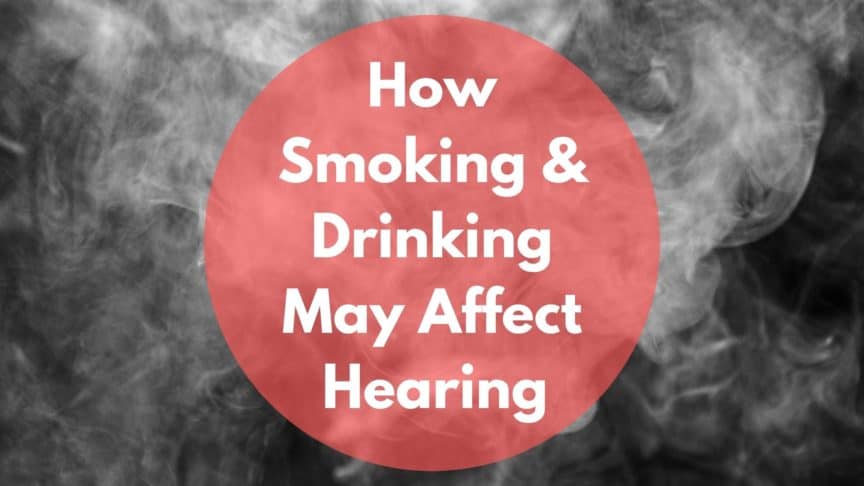- How to Care for Infants With Hearing Loss - April 15, 2024
- Hearing Aid Tips for Runners - April 5, 2024
- Overcoming Misconceptions Around Hearing Aids - March 27, 2024
Did you know that both smoking and drinking have been linked to hearing loss? Age and noise exposure aren’t the only things that can harm your hearing health. Individuals who smoke every day or drink heavily also have a higher risk of hearing loss. Here’s everything you need to know about how smoking and drinking may affect hearing.
Cigarette Smoking and Hearing Loss
It’s estimated that smokers are 70% more likely to have hearing loss than non-smokers. Smokers who smoke more than a pack a day are the most at risk of developing hearing loss. Individuals who smoke less are slightly less likely to have hearing loss. However, even people exposed to secondhand smoke still have a higher risk of hearing loss! What’s the connection between smoking and hearing loss? It turns out that several factors can lead to higher rates of hearing loss among smokers.
- Eustachian tube function: One way that smoking affects hearing is related to Eustachian tube function. This tube connects your middle ear to the back of the throat. It regulates air pressure, drains fluid, and helps maintain the health of your ear. Smoking can cause Eustachian tube dysfunction or blockage at the back of the throat. This increases your risk of damage to the inner ear.
- High blood pressure: Smoking cigarettes is linked to changes in blood pressure. When you have high blood pressure, the cells in the ear are under additional strain, and they can be damaged.
- Decreased blood oxygen levels: Smoking can decrease the amount of oxygen you take in. You’ll experience lower blood oxygen levels, and your extremities, including your ears, have less available oxygen. Your ears are very sensitive to these changes, and they’re easily damaged when they don’t get enough oxygen.
- Central nervous system function: Children and teens exposed to secondhand smoke can experience hearing loss. The toxins in cigarette smoke can damage the central nervous system or even affect development. This can lead to hearing loss in children and teenagers.
Alcohol and Hearing Loss
You probably already know about the obvious risks of excessive drinking, such as an increased risk of high blood pressure, heart disease, liver failure, or digestive problems. But did you know that excessive alcohol consumption can lead to hearing loss?
- Damage in the brain: Drinking large quantities of alcohol over a prolonged period can lead to hearing loss. Researchers have found that excessive alcohol consumption can damage the auditory cortex in the brain, leading to hearing loss. Over time, even moderate drinkers can start to experience nerve damage and develop hearing loss. Even if your ears can still pick up every sound around you, your brain isn’t able to process the sounds. This means you’ll experience hearing loss.
- Damage in the ear: Alcohol consumption is also linked to damage in the ear. Just like smoking, alcohol can impact the cells in the inner ear. Excessive drinking can decrease blood oxygen levels and increase toxins within the body. This can damage the ears and lead to permanent hearing loss.
- Temporary hearing loss: People who drink moderately or socially often consume alcohol at parties or places with a lot of noise. When alcohol and very loud noise are combined, people have an increased risk of temporary hearing loss and tinnitus. The more people drink in these settings, the worse their temporary hearing loss will be. This hearing loss can make it much harder to hear low-frequency sounds. It also increases your risk of permanent hearing loss.
Schedule a Hearing Test with Us!
Based on this research, both smoking and drinking can affect your hearing health. This is just one more reason to quit smoking and reevaluate drinking habits. You may also be wondering if you have a hearing loss.
A baseline test can show you exactly what you can hear today. If you have hearing loss, a comprehensive hearing test can help you determine what kind of hearing loss you have, and what your treatment options are. And if you don’t have hearing loss, a baseline test is the foundation for future hearing tests. You’ll be able to compare your next test to your baseline test to discover if your hearing health has changed. Call us today to book a hearing test.

